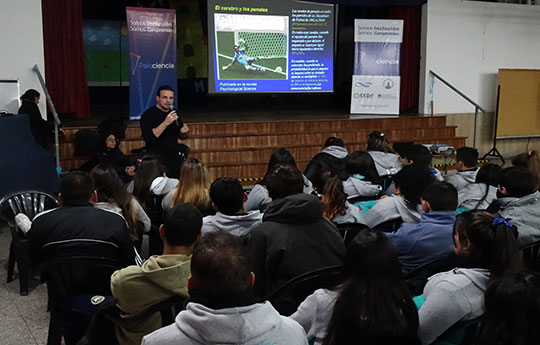SCIENTIFIC VOCATIONS
Researchers at the CONICET delivered talks on scientific promotion in Villa Soldati
More than 300 students participated in the activities of País Ciencia. There were also experimental workshops and a meeting with teachers.
Researchers of the National Scientific and Technical Research Council (CONICET) who are part of País Ciencia Platform delivered talks, workshops and met with teachers at the Instituto Nuestra Señora de las Gracias, located in Villa Soldati, in the city of Buenos Aires.
Dr. Claudio Fernández, native of Villa Soldati and director of the Platform, spoke about the importance of public education and stated that all students from all social classes should have the tools to study at university. There are not only soccer players in Villa Soldati, the country needs engineers, physicists and mathematicians”.
As regards the activities of País Ciencia, Rubén Mondragón, head of the educational institution, said that “the children will understand that the scientific world is not far from our relationship as members of a school”.
Hernán Grecco, PhD in physics and researcher at the CONICET, gave the first talk: “The light in the things”, in which he said that “important areas such as energy, education, health, data storage and communication have light as their main tool. During his speech, Greco conducted some experiments that can be done easily at home.
“Soccer, emotions and physics”, was the name talk in which Fernández, through videos of plays and world cup goals, explained the principles of physics, chemistry and the psychological factor that affects professional soccer players. Apart from that, the researcher highlighted the importance of team work and how science and technology can improve sports performance.
The last talk was called “In search of the emotional brain” and was in charge of Natalia Lozano, researcher at the Universidad Nacional de Lomas de Zamora. With some questions and attractive videos, Lozano interacted with the attendees to introduce some basic concepts about emotions, how the brain works, and its main divisions.
Experiments in the classroom
Apart from that, there were experimental workshops for students. Some of the themes were chemistry, physics, and how science is immersed in every day life. The students participated actively through the exchange of questions.
The first workshop was in charge of Dr. Olga Tarzi, chemist and researcher at the Council. At the workshop “Every day acids and bases”, the scientists introduced concepts such as acidity and alkalinity in practice with other ordinary elements.
Furthermore, the team for “popularization of science” conducted diverse experiments related to the physical phenomenon of synchronization, in which a system of autonomous oscillators interact between them until they coupled. Besides, they related that to the flash synchronization of fireflies.
There was also a meeting for teachers called “Do they breathe or ferment?”, which was in charge of Néstor Labonia, professor and PhD in biochemistry. The scientist and the teachers performed a simple experiment that could be done in the classrooms and attract student’s attention.
Finally, the members of the Platform spoke about their experiences at school and encouraged students to pursue a college career.
